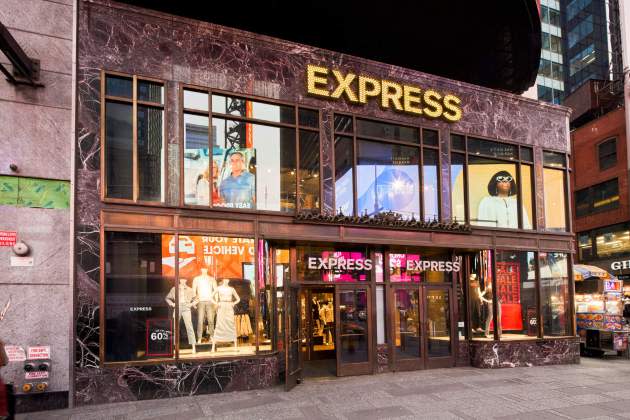Bankrupt Express Is on the Fast Track of Settling Leases

For Express, even while caught up in bankruptcy proceedings and liquidating about 100 stores, there appears to be hope for the future.
Once one of the nation’s hottest specialty chains, Express has been on a roller-coaster ride for two decades, beset by a swirl of management changes, mixed fashion messages and declining sales.
More from WWD
Express Closing 106 Stores as It Plans for Rebirth After Bankruptcy
Esprit Restructuring Globally, Layoffs Hit N.Y. Headquarters
Express CEO Seeks to Calm Bankruptcy Worries Following Report
On April 22, Express filed for bankruptcy, and Phoenix — the joint venture of brand management firm WHP Global and two of the retailer’s key landlords, Simon Property Group and Brookfield Properties — submitted a non-binding letter of intent to acquire the retail operations. WHP already owned the intellectual property. Combined, Simon and Brookfield have about 200 Express stores at their centers. They want the business to survive and plan to put in a stalking horse bid for the business. The bankruptcy code allows a debtor to assume or reject unexpired leases, and Simon and Brookfield settled on their combined 200 Express leases. On May 31, a court hearing is scheduled to possibly approve the bid and financing, unless another offer emerges that must be considered.
Things are moving fast. After Express went bankrupt, RCS Real Estate Advisors quickly renegotiated more than 190 Express leases with landlords (other than Simon and Brookfield), reducing rents to be more aligned with sales levels, altering expiration dates and reaching other terms.
RCS represents retailers in restructurings, whether the business is bankrupt or not. RCS helps retailers negotiate new leases, renew leases and get out of leases, often functioning as what Ivan Friedman, the founder, president and chief executive officer of RCS, describes as “a whole outside real estate department.” Among RCS’ clients are Lids, Fragrance Outlets, Perfumania, True Religion, Walgreens and World Market. RCS has offices in New York, Los Angeles, Dallas and Minneapolis.
In the following Q&A, Friedman discusses his firm, the situation with Express, and renegotiating its leases on a major portion of the specialty chain’s fleet.

WWD: Describe what RCS does and its services.
Ivan Friedman: We have three main practices, restructuring retail companies, whether they are in or not in bankruptcy, working with healthy retail companies to get out of problematic stores or renewals to get the rents down, and we do a lot of new leasing for companies that want to grow. Our negotiators get their assignments. They call the landlords, explain the situation, how much rent the retailer can afford, and they get the right rent deal. I’ve been in business for 43 years and it’s challenging every day. We can function as the retailer’s whole outside real estate department. We have offices in New York, Los Angeles, Dallas and Minneapolis and a large team includes many senior negotiators.
WWD: What’s been RCS’ role in the Express restructuring?
I.F.: We have been a very important contributor to this whole process. We’ve been concentrating on the rent relief part. Express filed on April 22. They retained us on April 26 and we started our calls on the first of May and basically completed the project in about 10 business days. That’s very fast. It doesn’t usually happen in 10 days, but they were up against this deadline with Phoenix. And everything had to be done very expeditiously. So we called the landlords and explained to them, if it doesn’t happen by a certain date, the company could liquidate. We needed their answers very quickly. And fortunately, the landlords were cooperative in this case. It usually takes more time than that. So we called on landlords and explained to them what the situation is and how much rent the company can afford to pay going forward, which is considerably less than the current rent. Of the 517 Express stores, a little over 400 stores will continue, and for the most part, very few of them can handle the same rents. Simon and Brookfield are partners in this endeavor. I basically worked on the other 200 stores with other large landlords.
WWD: Who are some of the landlords that you were negotiating with on Express leases?
I.F.: Macerich, URW (Unibail-Rodamco-Westfield), CBL, Pyramid and Tanger.
WWD: With those landlords, you’re talking primarily locations in centers. Did you work on leases on street locations as well?
I.F.: They don’t have many street locations, but there is one great location in (New York’s) Times Square.(Express) rejected that store the first day. They started a going-out-of-business sale there the first day. It was always a loser. They never made a profit on that store because of the rent. The rents in Times Square can be $2,000 a square foot. And they spent a lot of money building out that store.
WWD: Can you describe the lease terms reached with landlords you negotiated with on behalf of Express?
I.F.: I’m not going to say what the percentage off was in this case with Express, but generally, having done bankruptcies for 40 years-plus, a situation like this requires a discount of something like 40 percent off the current rent. That’s a rule of thumb I use in bankruptcies. The occupancy should be a certain percentage of sales. It’s very easy to look and say, OK, what percentage of sales do I have to pay the landlord in order to make the proper profit in that store? And generally, retail companies are fairly successful in the 10 to 15 percent range.
WWD: How did it work out with those Express landlords your team negotiated with?
I.F.: I’m happy to say based on the (short) time frame we were given in this situation, we accomplished the goal in 10 business days. We were successful in getting the right rents on close to 200 stores. So those stores will stay in business, assuming Express comes out of bankruptcy. Some landlords felt that their real estate was worth more, and would rather take it (the site) back than reduce the rent, but not too many, a handful.
WWD: With these leases being renewed, how many years are they for, before they expire?
I.F.: I would not say specifically in this case, but from my experience the deals range between three and five years. You have to understand you are asking the landlord to drastically reduce rents. They won’t do seven to 10 years. It’s generally a three-to-five-year time frame in a bankruptcy that we get for tenants. (Landlords) like to see what a company does, and not be tied into what they consider to be under-market rents or rents that are too low. So they’re looking for the success of the company.
WWD: What went wrong with Express?
I.F.: With retail companies, it boils down to merchandising. If they have the right merchandise, the stores do fine. And if they don’t have the right merchandise that’s appealing, that’s the primary downfall. And so the merchandising, I guess, has been bad because sales are bad. The public is very fickle. They come into a store. They love the store and they buy and they come back and then they don’t see the merchandise they want. They’ll come back two more times and then they’re gone.
WWD: Isn’t rent often the major factor leading to a bankruptcy?
I.F.: Rent can become the largest problem if your sales are declining. Rent and payroll are the two largest expenses in running a retail company. Payroll used to be at around a 12 or 13 percent level (on average) but with the minimum wage going up, it’s up to 15 to 16 percent. The rent in a healthy company is kind of in that range, but as sales decrease, (rents and payroll) stay at the same percentage, so the occupancy cost as a percentage of sales goes up.
WWD: What’s the status of the Express stores getting liquidated?
I.F.: They hired Hilco to liquidate those stores, and have been running sales for two or three weeks.
WWD: What other projects are you on now?
I.F.: Francesca’s has been out of bankruptcy now for three years. They’re not closing any stores at this point. We are negotiating a number of the leases coming up for renewal. We have three or four other specialties (retailers) that have emerged from bankruptcies where I’m doing large renewal packages.
Best of WWD

 Yahoo Finance
Yahoo Finance 